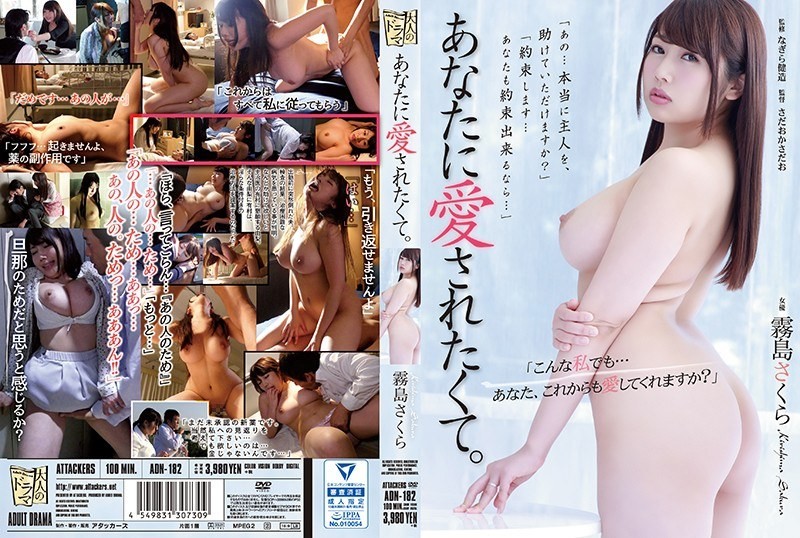Kirishima Sakura’s “ADN-182 I Wanted To Be Loved By You” Overview
The Japanese adult film industry continues to evolve, producing works that often blend artistic storytelling with provocative themes. Among these, ADN-182 "I Wanted To Be Loved By You," featuring the renowned actress Kirishima Sakura, stands out as a notable entry. This film explores complex emotional landscapes and personal vulnerabilities through its compelling narrative and performances. In this article, we delve into the various aspects of ADN-182, from its production background to its reception, providing a comprehensive overview of this significant work and Sakura’s impactful role.
Overview of ADN-182 "I Wanted To Be Loved By You" Featuring Kirishima Sakura
ADN-182 "I Wanted To Be Loved By You" is a Japanese adult film that has garnered attention for its nuanced storytelling and strong performances. The film centers around themes of love, longing, and emotional connection, portraying the protagonist’s quest for genuine affection and acceptance. Kirishima Sakura, a prominent figure in the industry known for her expressive acting and captivating presence, takes on a pivotal role that drives the film’s emotional core. Her portrayal has been praised for its authenticity and depth, elevating the film beyond typical adult cinema.
The narrative unfolds through a series of intimate scenes interwoven with moments of introspection, capturing the protagonist’s internal struggles and desires. The film employs a cinematic approach, emphasizing mood, atmosphere, and character development. Its storytelling style balances sensuality with emotional resonance, aiming to evoke empathy and reflection from viewers. The title itself hints at a universal yearning for love and acknowledgment, themes that resonate throughout Sakura’s performance and the film’s overall message.
Visually, ADN-182 features high production values, with careful attention to lighting, cinematography, and sound design. These elements work together to create an immersive experience that emphasizes the emotional stakes of the characters. The film’s pacing allows audiences to connect with the protagonist’s journey, making Sakura’s role as the emotional anchor even more impactful. Overall, ADN-182 stands as a noteworthy example of adult cinema that prioritizes storytelling and character exploration.
Kirishima Sakura’s involvement in ADN-182 has contributed significantly to its recognition. Her reputation for delivering nuanced performances lends credibility and depth to the film’s narrative. Fans and critics alike have appreciated her ability to portray vulnerability and strength simultaneously, making her character memorable and relatable. The collaboration between Sakura and the director highlights a shared commitment to creating a work that is both provocative and emotionally meaningful.
The film’s reception has been positive within its niche, with particular praise directed at Sakura’s compelling portrayal. It has sparked discussions about the potential for adult films to serve as platforms for expressive storytelling. ADN-182’s success underscores the evolving landscape of adult cinema, where artistic intent and emotional authenticity are increasingly valued. As a result, the film has solidified Sakura’s status as a versatile actress capable of handling complex roles that challenge conventional genre boundaries.
Background and Production Details of the ADN-182 Film
ADN-182 "I Wanted To Be Loved By You" was produced by a prominent Japanese adult film studio known for its focus on high-quality, narrative-driven projects. The production aimed to blend artistic filmmaking techniques with adult content, emphasizing storytelling, character development, and emotional depth. Filming took place over several weeks, with locations carefully chosen to evoke intimacy and realism, enhancing the film’s immersive quality.
Director Takashi Yamada, renowned for his work in both mainstream and adult cinema, helmed the project with a vision to create a film that transcended typical genre constraints. His approach involved detailed character backstories, nuanced dialogues, and a focus on naturalistic performances. This direction aimed to foster genuine emotional connections between the characters and the audience. The production team prioritized high production standards, including cinematography, lighting, and sound, to craft a visually and aurally compelling experience.
Kirishima Sakura was cast for her reputation as a versatile actress capable of delivering emotionally charged performances. Her preparation for the role involved extensive character research and collaboration with the director to ensure authenticity. The script was written to explore complex themes of love and vulnerability, with dialogues crafted to reveal character inner worlds subtly. The production also incorporated a soundtrack that complemented the film’s introspective mood, reinforcing its emotional tone.
The film’s editing process was meticulous, focusing on pacing and narrative clarity. The final cut aimed to balance explicit scenes with moments of quiet introspection, creating a rhythm that engaged viewers emotionally. The studio’s commitment to quality was evident in the post-production phase, which included color grading and sound design to enhance the film’s artistic appeal. Overall, ADN-182 exemplifies a deliberate effort to elevate adult cinema through thoughtful production choices.
Marketing for ADN-182 targeted audiences seeking more than just erotic content, emphasizing its artistic and emotional dimensions. The film was promoted through specialized channels, highlighting Kirishima Sakura’s acclaimed performance and the director’s artistic vision. Its release was accompanied by reviews praising its innovative approach within the adult genre. The production’s success demonstrated a growing appreciation for films that combine sensuality with storytelling, reflecting broader shifts in the industry.
Character Analysis: Kirishima Sakura’s Role and Development
Kirishima Sakura’s character in ADN-182 is central to the film’s emotional narrative. She portrays a woman grappling with feelings of loneliness and a deep desire for authentic love. Her character is nuanced, embodying vulnerability, resilience, and longing. Sakura’s performance brings a layered complexity to the role, capturing the subtle shifts in emotion that define her character’s internal journey.
Throughout the film, Sakura’s character undergoes significant development. Initially portrayed as guarded and hesitant, she gradually reveals her emotional wounds and her yearning for connection. Her interactions with other characters are marked by a delicate balance of openness and restraint, showcasing her ability to convey internal conflict through nuanced expressions and body language. This development invites viewers to empathize deeply with her character’s struggles and aspirations.
Kirishima Sakura’s portrayal emphasizes the human side of her character, making her relatable and sympathetic. Her expressive acting allows her to communicate complex feelings without relying solely on dialogue, utilizing subtle gestures and tone of voice. This approach enhances the authenticity of her character, making her journey compelling and emotionally resonant. Her performance serves as a testament to her skill in balancing sensuality with emotional depth.
The character’s arc also explores themes of self-discovery and acceptance. As the story progresses, Sakura’s character begins to confront her fears and insecurities, opening herself up to the possibility of love. Her growth is depicted with sensitivity and realism, encouraging viewers to reflect on their own emotional experiences. Sakura’s role challenges stereotypes often associated with adult film characters, presenting her as a fully realized individual with depth and agency.
In terms of character design, the filmmakers crafted Sakura’s appearance and personality to align with her emotional narrative. Her wardrobe, expressions, and interactions are carefully curated to reflect her inner world. The complexity of her character adds layers to the film’s storytelling, making her one of the most memorable aspects of ADN-182. Her performance not only elevates the film but also contributes to broader conversations about character portrayal in adult cinema.
Kirishima Sakura’s role in ADN-182 has been widely appreciated for its depth and authenticity. Her ability to embody a multifaceted character demonstrates her versatility as an actress. Her portrayal has inspired discussions about the potential for adult films to explore genuine human emotions and relationships, breaking away from stereotypical portrayals. Sakura’s performance remains a highlight of the film, cementing her reputation as a leading figure capable of delivering emotionally impactful roles.
Themes and Messages Conveyed in "I Wanted To Be Loved By You"
The core themes of ADN-182 "I Wanted To Be Loved By You" revolve around the universal human desire for love, acceptance, and emotional intimacy. The film explores the intricacies of romantic longing, emphasizing that genuine connection often requires vulnerability and courage. Through its narrative and performances, the film encourages viewers to reflect on their own emotional needs and the barriers they face in forming meaningful relationships.
Another prominent theme is self-discovery and personal growth. The protagonist’s journey toward understanding and accepting her feelings mirrors broader themes of introspection and emotional resilience. The film suggests that true love involves confronting one’s insecurities and opening oneself to vulnerability. This message is conveyed subtly through character interactions, dialogue, and visual storytelling, making it resonate on a deeper level.
ADN-182 also examines societal perceptions of love and intimacy, challenging stereotypes and advocating for authentic emotional expression. The film portrays characters who are complex and imperfect, emphasizing that love is not always neat or straightforward. It highlights the importance of empathy, patience, and communication in building genuine connections. These messages contribute to a more nuanced understanding of human relationships within the context of adult cinema.
Furthermore, the film underscores the idea that emotional fulfillment is as important as physical intimacy. It portrays sexuality as an extension of emotional connection, rather than merely a physical act. This perspective elevates the narrative, aligning with contemporary discussions about the importance of emotional authenticity in intimate relationships. The film’s messages advocate for a compassionate and honest approach to love and intimacy.
The cinematic approach to these themes involves a mix of introspective monologues, subtle visual cues, and nuanced performances. It invites viewers to consider the emotional landscapes of the characters and reflect on their own experiences. The film’s message promotes understanding, vulnerability, and the pursuit of genuine love, making it a meaningful contribution to adult cinema that seeks to blend entertainment with emotional insight.
Audience Reception and Critical Response to the Film
ADN-182 "I Wanted To Be Loved By You" has received a generally positive response from its target audience, particularly those seeking adult films with artistic and emotional depth. Fans have praised Kirishima Sakura’s compelling performance and the film’s thoughtful storytelling, which distinguish it from more conventional adult content. Many viewers have appreciated the balance between sensuality and emotional authenticity, finding the film both engaging and meaningful.
Critical response within industry circles has also been favorable, highlighting the film’s high production standards and thematic richness. Critics have noted its successful integration of cinematic techniques, such as atmospheric lighting and naturalistic acting, which elevate the genre. The film is often cited as



